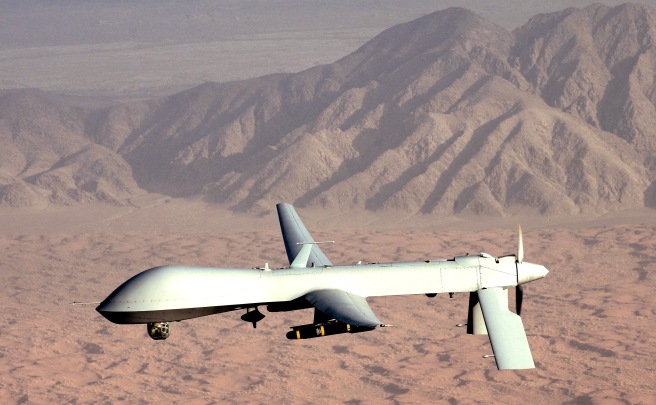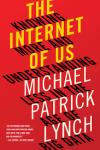In the case of robotic weapons, it is becoming increasingly unclear who, or what, is accountable and responsible for the actions performed by complex, hybrid, man-machine systems on the battlefield.
(Floridi, L., Taddeo, M., 2014, p. vii).
×
“You will be assimilated. Resistance is futile.“
Or should Google Star Trek Earth Track® state:
You will be annihilated. Resistance is futile.

This is a General Atomics MQ-1 Predator, an UAV (“unmanned aerial vehicle”). Put simply, a drone. As so many other technologies of our time, it was created to serve military purposes. It is equipped with a powerful “eye”: cameras closely monitored from afar. Eventually, as it found its way to the real meaning for its existence, the Predator was armed with AGM-114 Hellfire missiles. The story and the ethics of this unmanned & armed hunter-killer is discussed masterfully (and very critically) by Grégoire Chamayou in Drone Theory. He describes it as a “story of an eye converted into a gun”, a portray depicted by a US Army general:
—We’ve moved from using UAVs primarily in intelligence, surveillance, and reconnaissance roles […] to a true hunter-killer role with the Reaper [an evolved Predator].
“intelligence roles“, he said. And isn’t intelligence another word for information? It seems like we from Library & Information Science are not so distant from these issues (we are talking warfare here!) than we might think. Did I miss something, or “intelligence roles” configured a bridge between a high-tech device and annihilation—going from a flying computer to managing information, then to bombing—, when it comes to the evolution of the military drone?
In his book, Chamayou presents and discusses many fascinating questions related to the use of these kind of intelligent weapons in war and that should concern us, including:
• What happens to the very concept of war and combat, when armed drones convert them into ‘a campaign of what is, quite simply, slaughter‘? Isn’t the use of the armed drone an attempt to abolish the principle of direct reciprocity, and if it is, doesn’t it impact the foundations of Just War and military virtue—as the state turns its soldiers into assassins by completely removing them from the hostile environment? How is it possible that a Predator or a Reaper are considered by some a humane arm?
• As the opposition combatants (can we even call them that, if there is no proper battlefield?) become targets to be under constant vigilance and eventually shot with a missile, what happens to the whole community they are a part of? ‘The buzz of a distant propeller is a constant reminder of imminent death‘. Aren’t drone attacks responsible for a war without victory?
• And what happens to the mental state of the soldier who becomes a drone pilot—who drives to work to watch, chase and kill people by computer command, to later go back home to play football with his son—as he is not engaged in military service at a battlefield in the traditional sense? Does he need to be more like a robot to be able to make that daily, radical switch between war & peace—that is, less critical, and less able to rebel, even able to not think?
As we can see, there are infinite important issues related to IW, Information Warfare; no wonder why Luciano Floridi stopped to reflect on these issues, too. In 2014 he joined Mariarosaria Taddeo to edit The Ethics of Information Warfare, a volume of twelve essays written by different authors on the many questions IW pose today. In one of the essays, Armed Robots and Military Virtue, Shannon Vallor seems to agree with Chamayou when she states that
[..], the widespread deployment of armed military robots may have ethically deleterious effects on human soldiers and civilians independently of whether optimistic utilitarian predictions of reduced casualties and collateral damage are realized. [my emphasis]
×
But this information warfare debate isn’t supposed to make us shy away from information & the Internet entirely; no one is calling for a return to a complete offlife. It’s actually a call for understanding. Besides, it’s extremely difficult and undesirable that we run away from “the Internet”; much longer posts than this could be written on all the wonders of the World Wide Web and the benefits it brings to societies. But because good&evil are so hardly discernible in the infosphere (even more so in war), we should be specially critical and conscientious when navigating through it—and when building it, as Library & Information scientists. To use Michael Lynch’s words in The Internet of Us: Knowing more and Understanding less in the Age of Big Data:
We should not fear information technology per se, or the “Internet” in the expanding Internet of Us. It is the “us” part—or our uses of technology—that we must mind. We are becoming more powerful knowers. We just must also strive to be more responsible, understanding ones.
×
And finally, when it comes to the implications of the internet:
—Let me just sit back here for moment while this search engine does this research for me.
—Let me just sit back here for a moment while this drone fights this war for me.
what differences are you able to spot?
×
References



